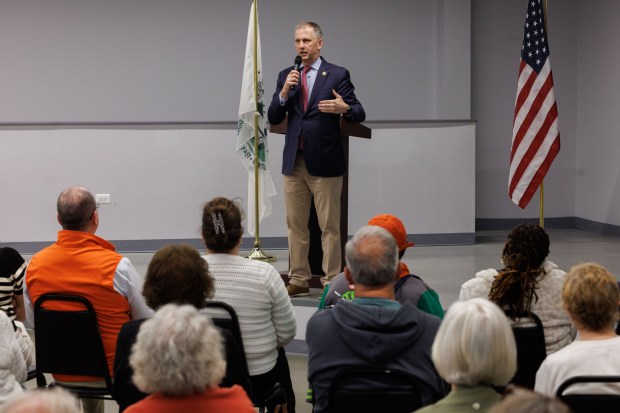After agreeing to purchase the century-old former Associated Bank building in downtown Waukegan to take ownership of an entire city block in 2021, it took the city of Waukegan more than 3½ years to close the deal in part because environmental issues needed to be resolved.
Reaching an agreement with the bank to create a $75,000 escrow, effectively reducing the purchase price, yet another delay arose when the council’s Community Development Committee delayed action on a resolution to retain needed environmental services.
Ald. Victor Felix, 4th Ward, used his aldermanic prerogative to postpone consideration of the resolution until Mayor-elect Sam Cunningham takes office, so he can review the proposal.
“I’d like to hold this over until the new administration comes in,” Felix said. “It’s a very important development area, and I don’t think two weeks would be a hindrance on us. There are a lot of things that could be changed, I’m pretty sure.”
The next scheduled Community Development Committee meeting is June 2.
A proposed budget will also be waiting for Cunningham. At the regular City Council meeting after the committees adjourned, interim Finance Director Don Schultz presented a budget for the fiscal year starting May 1. Cunningham takes office May 5, when the council next meets.
Noelle Kischer-Lepper, the city’s director of planning and economic development, said at the committee meeting that the block which the city now owns is bounded by Sheridan Road, and Washington, Genesee and Water streets.
During a prolonged due diligence period on the acquisition of the former bank building, Kischer-Lepper said one of the issues causing delay was environmental. Before developers can offer the city proposals, everyone must understand all the environmental concerns.
As closing the deal lagged longer and longer, Kischer-Lepper said an agreement was reached with the bank to reduce the price by the bank, placing $75,000 in escrow for the city to use for remediation. It has 18 months from April 4 to use the money.
“Starting this contract right away, we can get as far down the line with that work as possible to get the IEPA’s approval for a no more remediation letter,” she said. “That will give (a) developer site security of exactly what’s there, what still has to be removed (and) what has been removed.”
Ald. Thomas Hayes, 9th Ward, said the environmental remediation work must be done before any discussions with developers can take place. He is concerned that 18 months may not be enough, and the ability to use the $75,000 may be lost.
“It takes a really long time to do that kind of work, and we’re acting really responsibly if we do the work as soon as possible,” Hayes said. “As somebody who has tried to push for development and contracts to be let as soon as humanly possible, can you explain why we should delay environmental cleanup downtown so we can spur additional development?”
Ald. Lynn Florian, 8th Ward, tried to override Felix’s prerogative to delay action, but the panel voted 3-2 to let the holdover stand. Ald. Juan Martinez, 3rd Ward, and Ald. Michael Donnenwirth, 7th Ward, joined Felix in voting for the delay. Hayes and Florian voted to proceed.
During the City Council meeting itself, Schultz outlined the proposed $284.9 million budget. The anticipated expenses will be paid with projected revenue of $261.9 million, and around $23 million in cash reserves. Total reserves are more than $115 million, including specially allocated funds.
Since the fiscal year starts May 1 and Cunningham will take his oath of office May 5, Mayor Ann Taylor said the budget was prepared but not presented to the council for a vote to let Cunningham alter it as he deems appropriate.
“Our budget is usually done on May 1, but in election years sometimes that is postponed so the new mayor can come in and put their touches on it,” Taylor said. “We have a new budget in place. It can be tweaked.”



